Robotics Cabinet, Scientific Escape Room Opened in Ružička's Birth House
September 23, 2022 - In the birth house of Lavoslav Ružička, a Vukovar-born scientist and Nobel prize laureate, the Youth Peace Group Danube presented their project "raSTEM - Development of STEM in Vukovar". A Scientific Escape Room and a Technical-Robotics Cabinet were opened as its result.
As Glas Slavonije reports, the partners on this project were the European Home Vukovar, FERIT Osijek, the Nikola Tesla Technical School Vukovar, the City of Vukovar, the VURA Development Agency and the Vukovar Gymnasium.
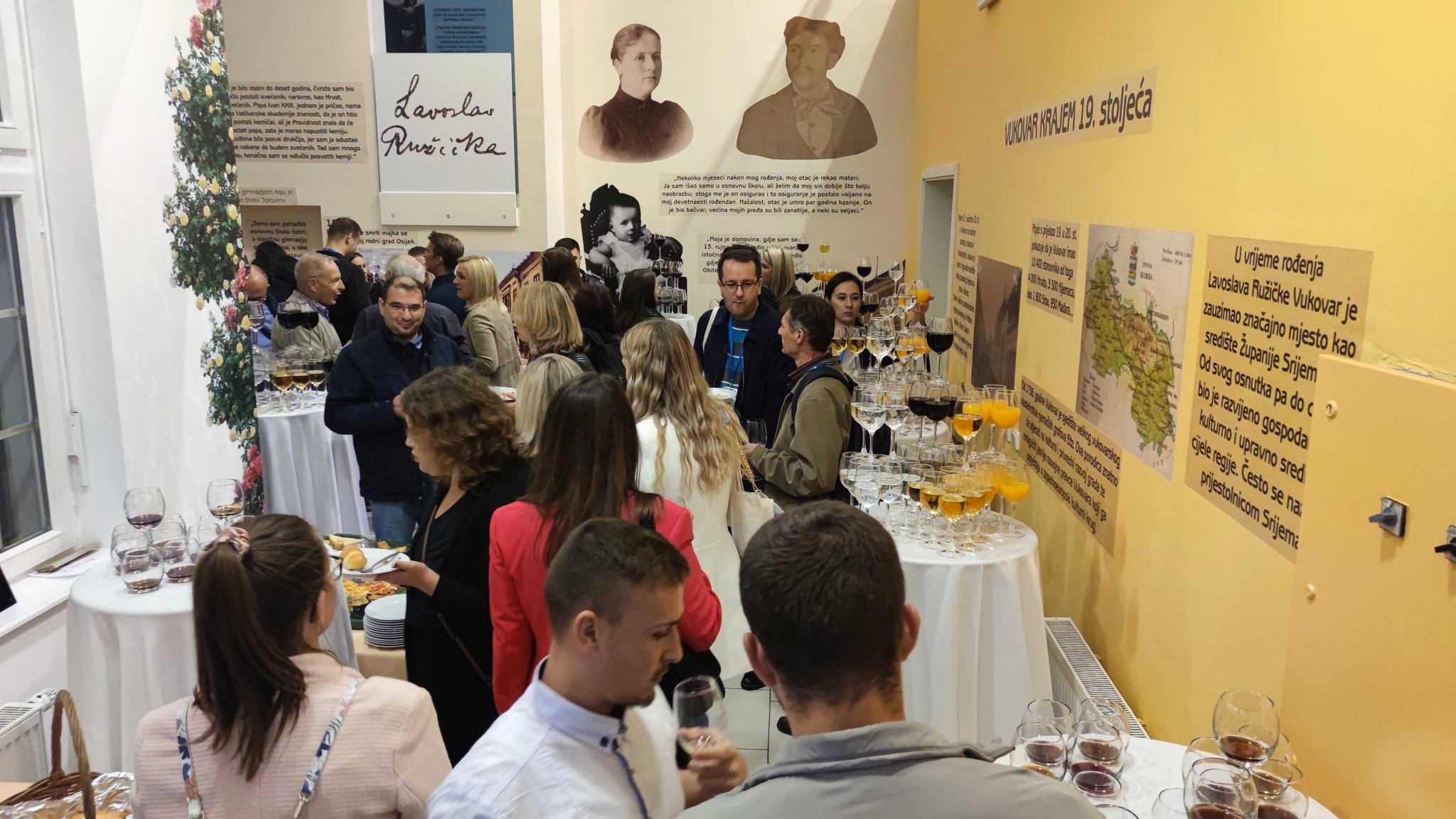
"We also decorated the hall of Ružička's house, which will enable visitors to experience Lavoslav Ružička in the way we should value him, since he is a Nobel laureate born in Vukovar. The scientific escape room offers content related to chemical processes and chemistry in general, while the Technical-Robotics Cabinet is intended for the implementation of workshops, which means that we have equipped a space in the very centre of the city where young people will be able to enjoy STEM content through informal education", explained project manager Martina Uglik, adding that these are dedicated installations that will remain available to citizens even after the end of the project itself.
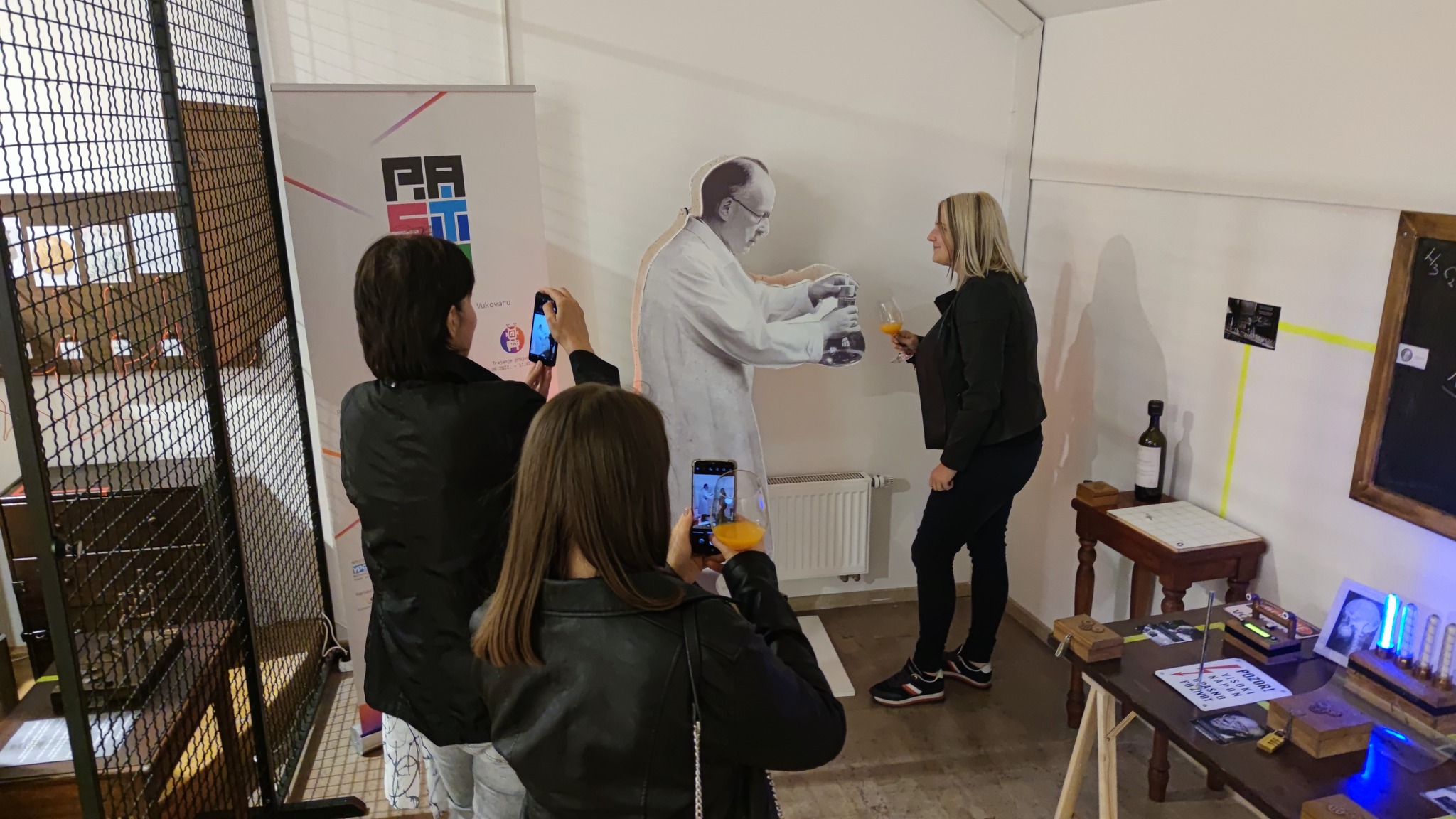
Ivanka Miličić, director of Hrvatski Dom (which manages Ružička's house), stated that they provided the space for the Youth Peace Group Danube, because the newly installed contents complement the existing ones, primarily the hologram of Lavoslav Ružička, which was installed so that the prominent scientist himself tells his life story.
"The goal was for his story to be presented in a way that children and young people can easily understand it. A photo exhibition about Ružička's life has also been set up, the new content is being followed up in the best way and what we have now is the result of the realisation of three smaller individual projects. Citizens who want to see the hologram should contact us, since Hrvatski Dom does not have a large number of employees, so we do not have a person who is solely responsible for the presentation of the contents of Ružička's house", said the director.
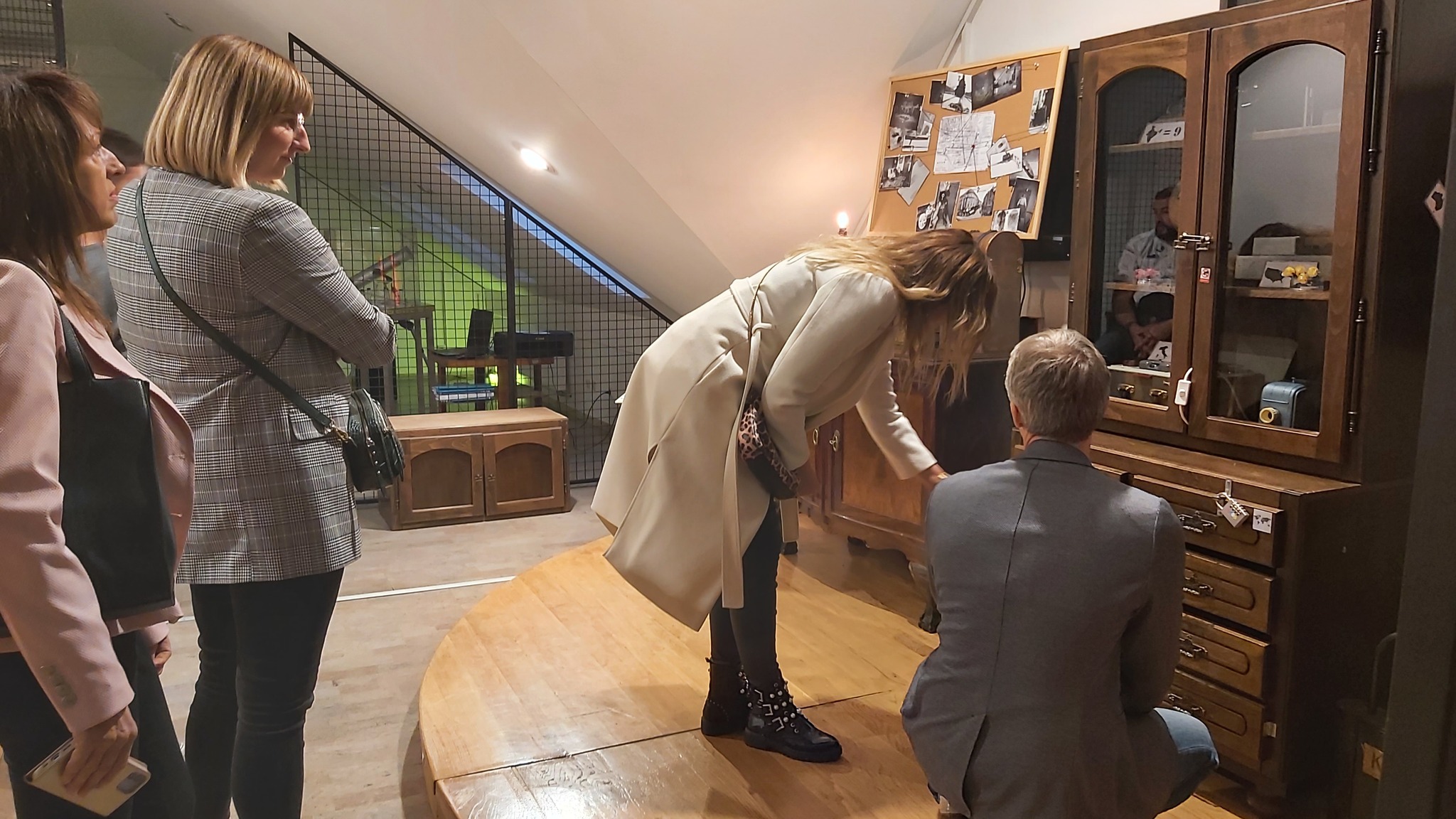
By presenting two new contents, Hrvatski dom and Youth Peace Group Danube participated in the organisation of Ružička Days, an international scientific and professional meeting held for the 19th time in the city on the Danube.
"Young Chemists Conventions take place in Ružička's house. Our goal is to pass what we do on to the younger generations, and the Young Chemists Conventions occupy an increasingly important place in the scientific circles", emphasised Miličić.
All photos courtesy of Youth Peace Group Danube.
For more, make sure to check out our dedicated Lifestyle section.
New, Fourth Mammoth Tooth Found in Mohovo near Ilok
August 2, 2022 – Maybe you have never heard of Mohovo, and maybe you know that they keep finding mammoth teeth there... There is really no in-between. A new, fourth mammoth tooth was found on Saturday, 30th July.
As SiB reports, ten years after he found the first mammoth tooth in his village, Goran Popović from Mohovo found another, fourth, mammoth tooth on Saturday.
He informed his friends and the public about the phenomenal discovery by posting on Facebook, stating that he was filled with happiness, emotions, and optimism.
"I had that instinct again, walked through our beautiful village, and then it happened – the fourth mammoth tooth. All of a sudden, a part of the hill collapsed and the tooth just popped out. Now I'm completely convinced that this is no longer a coincidence", he wrote and invited everyone to join in and help, because a lot of support is needed to start the systematic search of the location.
SiB spoke about this discovery with Goran, who, still under a strong impression, said that not a single find was the result of purposeful digging and searching, but that he found each tooth completely by accident.
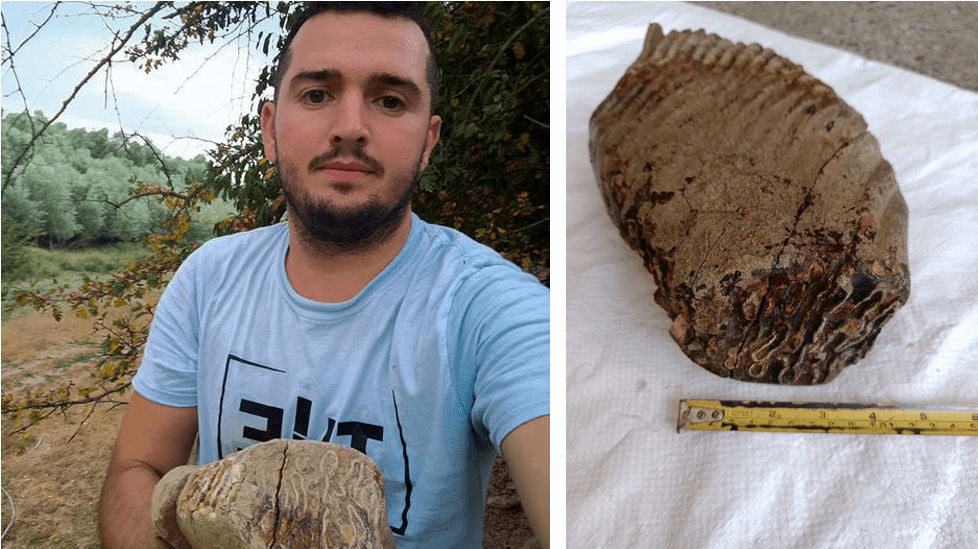
Photos by Dolina Mamuta
“Last year, the Minister of Culture, Nina Obuljen Koržinek, visited the site of the discovery, the county and city authorities came, and we received promises from all of them that they would do everything in their power to start archaeological research. I know that the activities in the wider Vukovar area focus on Vučedol, but I believe that the finding of another tooth will motivate the authorities to pay attention to Mohovo as well. It would be an important step in the promotion of our small village and it would certainly make it more attractive not only in terms of archeology but also in terms of culture and tourism”, said Popović.
The relevant ministry and the Ilok City Museum were immediately informed about the discovery, as well as the City of Ilok, and the Vukovar-Srijem County. He emphasized that this place with only two hundred inhabitants obviously hides great secrets that experts need to investigate. It all started in the fall of 2012 when, while digging a septic tank in an orchard, he found the first fossil remains of a woolly mammoth, and a discovery was made four years later in another location. Goran states that short research, in addition to the woolly mammoth and the woolly rhinoceros, led to the discovery of fossil remains of a hyena, a wild horse, and a bison. Four years after the second discovery, there was a third one, when the fossil remains of a mammoth were found again near the village pond. Realizing the potential hidden in their village, several young residents of Mohovo founded the association Dolina Mamuta (Mammoth Valley). They organised workshops, installed a straw sculpture of a woolly mammoth, a woolly rhinoceros, and a hyena in the village centre, and launched the events "Advent in Mohovo" and "Mammothfest", the second edition of which is planned for this October.
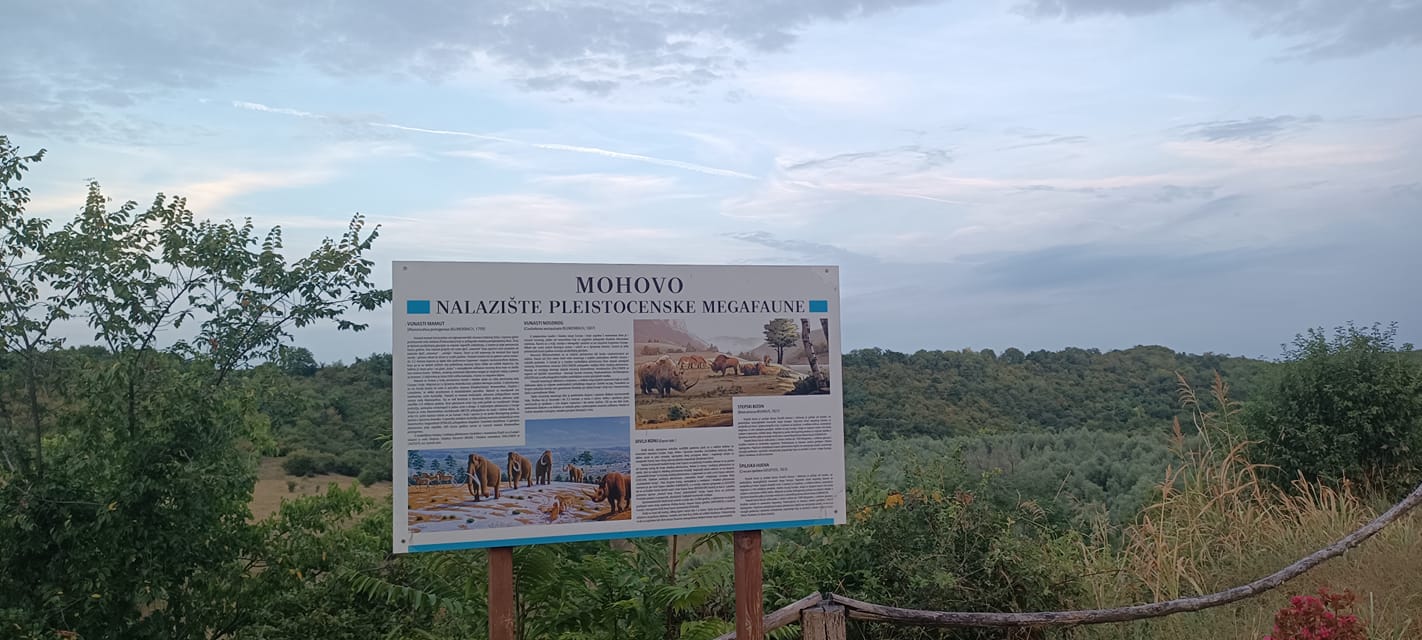
Photo by Dolina Mamuta
“The creation of a sculpture made of solid material is nearing completion, for which we were provided funds through donations after the straw sculpture was destroyed in a fire.
For the second "Mammothfest", we plan to organize an exhibition about the findings so far and additionally motivate the authorities for systematic research” he stated.
For more, check out our lifestyle section.
Minister Says Science, Higher Education Act One of Key Laws
ZAGREB, 5 April 2022 - Science and Education Minister Radovan Fuchs said on Tuesday that over the past two years his ministry had worked on amending legal regulations, with amendments to the Higher Education and Science Act, to be put to public consultation soon, being among the most important.
Addressing a conference on education, taking place in Zagreb, Fuchs said that the ministry had launched a reform of the entire system - from pre-school education to higher education.
This includes changes designed to make pre-school education mandatory, introduce full-day classes in primary schools, and increase the number of children attending grammar schools.
In Croatia, he said, 30% of students enroll in grammar schools while the European average is 45%. A reform of vocational education is also underway and entirely new curricula are being defined for a set of vocational programmes, he said.
Higher education and science law one of key laws
Speaking of the amendments to the Higher Education and Science Act, the minister said that they had been fully supported by the college of rectors and presented to all universities except Zagreb University, having received very constructive suggestions and proposals of which some would be incorporated in the amendments.
Fuchs said that Croatia's research and innovation results were significantly below the EU average, adding that Croatia was second to last in the EU in terms of the number of patents per capita, with only 4.8 registrations per million population, while the European average was 106.8.
Croatia is the third poorest-ranking EU member in terms of innovation success in 2020, he said, adding that this indicated that comprehensive measures should be undertaken to increase the capacity for innovation and cooperation between the research community and the industry sector.
Recalling that Croatia has an unfavourable ratio of financing and the average number of citations per paper, Fuchs said that this showed that investments in research were inefficient.
Number of students on decline, number of employees in higher education rising
Fuchs said that in the past five years the number of students in Croatia had dropped by 16,000 or 8%, while the number of employees in institutions of higher education had increased by 6%.
The minister recalled that the share of state funding for the system of science and higher education was based on those institutions' results, saying that Croatia had committed to that under the National Recovery and Resilience Plan, and that if it did not meet that criterion, it would be left without HRK 7.5 billion.
He also noted that one of the changes envisaged by the amendments to the Science and Higher Education Act was the introduction of a single, six-year term for university rectors.
Govt Amendments To Improve Preschool Education Standards
ZAGREB, 31 March 2022 - Ensuring equal opportunities for all children and including them in the education system, increasing the number of children included and improving the quality of the education system is the aim of the final draft bill on preschool education.
The recommended amendments the government sent to parliament on Thursday are part of the education reform within the framework of the National Recovery and Resilience Plan (NPOO), with Science and Education Minister Radovan Fuchs saying the bill by no means revokes the National Pedagogical Standard.
In order to ensure that all children aged three to six can attend preschool education by 2030, it is necessary to secure additional capacities and infrastructure with an investment of HRK 1.6 billion from the NPOO, which should enhance the capacity of preschool institutions by 22,500 places.
The bill proposes a national network of children's kindergartens in an effort to improve planning regarding the construction and reconstruction of preschool institutions and to reduce the differences in development, thus enabling the inclusion of more children in early and preschool education.
The bill enables the possibility for elementary school teachers to be employed in kindergartens.
Having in mind regional differences, the bill envisages the possibility of funding from the state budget to complete investments for EU projects to build kindergartens in less developed areas.
It also provides for the possibility to secure funding to maintain the fiscal sustainability of kindergartens established by local government units based on criteria set by the government.
Final draft bill on the Croatian Science Foundation
In an effort to boost the research and innovation potential and implement programmes planned under the NPOO, the government sent a final draft bill on the Croatian Science Foundation to parliament.
The foundation was established with the aim of developing and promoting science and technological development by ensuring support to research of strategic interest for Croatia, however, the incumbent legislation is outdated, inflexible and does not correspond to the research demands in Croatia or Europe, Minister Fuchs explained.
"In an effort to increase the efficiency and functionality of investments in science projects and enable the implementation of programmes set by the NPOO, the bill defines only the framework to grant funds while the actual programmes will be defined by the Foundation's general acts," Fuchs added.
Politics: For more, check out our politics section.
Zagreb Needs to Focus on Housing, Education and Protection Against Poverty
ZAGREB, 29 March 2022 - Housing, investing in education institutions and expanding services for citizens at risk of poverty and social exclusion are priorities Zagreb city authorities should focus on, it was heard at a presentation of Zagreb's social image for 2020 and 2021.
The head of the city office for social welfare, health, veterans and disabled persons, Romana Galić, said that new data points to the importance of creating a quality social policy regarding housing, which is the key to preventing social exclusion.
The social image points to the importance of expanding welfare services, particularly for children and youth as well as preventing dropping out of school.
Some of the essential measures, cited in the city's strategy to combat poverty and social exclusion for the period 2021 to 2025, refer to energy price hikes.
It is necessary to approach the most vulnerable population with preventative measures, education and energy packages to prevent them from falling into energy poverty.
Galić said the quality of life in Zagreb is of a high standard given the numerous services provided by institutions and civil society organisations however some indicators show that there is room for improvement.
She confirmed that the city plans to build public housing and her office has applied for funds for the most vulnerable to resolve housing issues.
Quake and pandemic adversely affect real estate market, employment, pay
The social image has been prepared for 20 years now and represents one of the strategic documents that are important for social planning and evaluation. It shows the situation and challenges in nine areas: population, household and family, housing, education, employment and unemployment, economic indicators, healthcare, welfare and co-financing projects and programmes.
Number of Chilean Undergraduates in Croatia Increases Twofold
ZAGREB, 26 March 2022 - The number of students from Chile attending university programmes in Croatia has doubled this year since the previous school year, and Croatia can expect even more Chilean undergraduates after the election of Gabriel Borić, who has Croat roots, as the president of that South American country.
This academic year, there are 45 Chilean students enrolled in the ongoing semester course of Croatian Language and Culture provided by Croaticum Centre in Zagreb.
Croaticum, established in 1962 as the Centre for Croatian as a Second and Foreign Language, is the oldest and largest institution engaged in teaching, research and description of Croatian as a second and foreign language. It is part of the Department of Croatian Language and Literature at the Faculty of Humanities and Social Sciences of the University of Zagreb.
In the last five years, 163 students from Chile have attended Croaticum programmes.
In Chile, a country with 19 million inhabitants, there are about 400,000 ethnic Croats, who make up 2.4% of the total population.
The newly-elected president Gabriel Boric is a descendant of Croatian emigrants, and his great grandfather arrived in Chile from the Croatian island of Ugljan off Zadar.
Lector for the Croatian language at the University of Magallanes in Punta Arenas, Kristina Barišić, has said that Boric's election has contributed to a growing interest of the Chilean general public in Croatia.
This was also an encouragement for Croatian expat communities, she told Hina.
Two undergraduates of that university, Makarena Mansilla Carrasco and Javiera Astorga Vodanić, are among the current students of the ongoing semester course of Croatian Language and Culture at Croaticum Centre in Zagreb.
Makarena has told the ITV Patagonia broadcaster that she was highly motivated to get better knowledge of the culture of Croatia.
This 26-year-old student of psychology has received a scholarship of the Croatian government and agency for mobility and EU programmes for the continuation of her education in Croatia.
Javiera, who enrolled in the Nutrition and Diet at the Health Sciences Department of the Punta Arenas university, says that the possibility of being awarded the scholarship for education in Croatia has given an additional impetus to her to learn the Croatian language.
Javiara, 23, who is currently staying in a student dorm in Zagreb, admits that the stories that Croatian is difficult to learn have additionally motivated her.
Varaždin Faculty of Informatics Joins #ScienceForUkraine Initiative
ZAGREB, 10 March 2022 - The Varaždin Faculty of Organisation and Informatics said on Thursday it had joined the #ScienceForUkraine initiative due to the catastrophic consequences of the Ukraine war on its academic community.
As part of the University of Zagreb, the Faculty joined the international scientific community's social media initiative to collect information about universities, scientific institutions, and other organizations within the system that can be of help to Ukrainian students and researchers.
The Faculty, present in four northwestern Croatian cities - Varaždin, Sisak, Zabok, and Križevci - is offering help to all Ukrainian students, teachers, and researchers with whom the University of Zagreb has bilateral cooperation.
The help envisages free continuation of education in Croatian or English, the possibility of completing part of the studies at the Faculty (student exchange programme), performing professional practice, involvement in teaching and research projects, and psychological counseling.
For more, check out our lifestyle section.
Croatian Students in the UK: Economic Benefits & Creative Career Opportunities
February 17, 2022 - The UK has seen a steep increase by 227% in the number of Croatian students within 5 academic years.
According to official statistics from Erudera.com, 1,180 students from Croatia studied in the UK during the 2019/20 academic year, quite the increase from 360 students in 2014/15. 1,000 of those students were based in England, while the remaining 120 of them were in Scotland and 55 in Wales.
So what’s brought on the steep rise of Croatian students in the UK in recent years? The interest to study in the UK first increased when Croatia joined the EU in 2013, as students now have the opportunity to study in the UK without the need to apply for a study visa. According to Gent Ukëhajdaraj from Erudera, statistics show that prior to Croatia joining the EU, there weren’t any Croatian students pursuing studies in the UK during the 2012/13 academic year. Following the change, 2013/14 saw 210 Croatian students in the UK, and by 2018 that number went up to 1,125.
Another benefit following Croatia’s joining the EU is that university tuition became more affordable. In 2019, UK Universities Minister Chris Skidmore announced that EU students starting a degree in the 2020/21 academic year would have guaranteed home fee status and financial support for the duration of their studies in England, meaning that they will pay the same fees as UK students do.
Skidmore stated that the government values the “important contribution that international students, including those from the EU, make to our universities and it is a testament to our world-leading higher education system that so many students from abroad choose to come and study here.” He continued to say that while the UK has chosen to go forward with Brexit, “we are not leaving Europe, and our universities thrive on the diversity of being global institutions”. Moreover, the country allows the best international students to remain in the UK and contribute to society through the Graduate route, giving them the opportunity to work or look for work at any skill level for 2 years (3 years for doctoral students).
But what about the educational and cultural benefits?
It seems that many Croatian students come to the UK to study highly-regarded subjects such as business, law, medicine and science, due to the quality of education and the supportive environment that UK universities offer, as well as the chance to study at some of the oldest and highest-ranking universities such as Oxford or King’s College London. But many come to apply for creative subjects such as fine and applied arts, textiles and design, English literature, film, performing arts etc. It helps that the country, especially London, is known for being a creative capital due to its rich cultural history as well as its industry connections, thus promising more career opportunities within a more creative, open-minded community. According to a King’s College student of English with film studies, studying in the UK opens up “more prosperous possibilities to follow my career path abroad than back home. Career-wise, I have been able to make connections in my area of interest faster and the quality of the options available to me is better”.
And of course, there are the benefits of studying in another language in general. Bilingualism is viewed as highly respectable and can prove beneficial when applying for jobs. And one of the most exciting aspects of studying abroad, it leaves for opportunities to travel and meet new people.
For more, check out our lifestyle section.
Nearly 4,000 Postgraduates Enrolled in 2020-2021 School Year in Croatia
ZAGREB, 29 Jan 2022 - During the 2020-2021 school year there were 3,987 postgraduate students enrolled in Croatia, and three-fifths of the enrollments were at the University of Zagreb (61.5%).
The smallest share of postgraduate students was at the University of Dubrovnik (0.4%), according to the data released by the national statistical office (DZS).
Of those 3,987 postgraduates, 13.5% were at the University of Rijeka, 9.1% at the University of Osijek, 7.9% at the University of Split, 3.7% at the University of Zadar, 2.1% at the Croatian Catholic University, and 1.3% at University North.
Women prevail among postgraduates
Broken down by gender, women prevailed, 56%, among postgraduate students, and broken down by age, the largest age cohort was between 25-29 with a 39.4% portion.
Broken down by branches of sciences, there were 21% of the enrollments in technical and social sciences each, whereas natural sciences accounted for 18.3%, and 5.7% were studying to earn a doctoral degree in interdisciplinary science programmes.
Lion's share of postgraduates Croatian nationals
As many as 95% of postgraduates had the registered place of residence in Croatia, also 96% were Croatian nationals, and 96.8% of those post-graduates already obtained a master's degree in Croatia,
Most enrollments were employees in the educational sector, 41%, and 3.3% of the postgraduates enrolled in the 2020-2021 academic year were jobless.
Roughly 46% of the students paid themselves postgraduate education fees, in 38.1% of the cases, the costs were covered by employers, and 13.2% of postgraduate studying was financed by the state budget.
For more, check out our dedicated lifestyle section.
Zagreb Mayor Tomislav Tomašević Announces New Model For Appointment of School Boards
ZAGREB, 3 Aug, 2021 - Zagreb Mayor Tomislav Tomašević announced on Tuesday that next Monday, applications would be invited for the appointment of members of school boards, with around 400 members to be selected, plus 200 who are representatives of local government units.
Speaking at a news conference, Tomašević said that under the new model, of the three school board members who are appointed as representatives of schools' founder, namely the City of Zagreb, one would be chosen from among representatives of local government bodies and two would be selected in an open competition.
Around 400 school board members will be selected in an open competition, around 200 will be nominated by heads of city district councils.
The boards of primary and secondary schools whose founders are local government units each have seven members, of whom three have so far been appointed exclusively by a decision by the mayor.
The Večernji List daily recently reported that the appointment of some of the school board members in an open competition would be introduced by Zagreb and Split, whose mayors, Tomašević and Ivica Puljak respectively, have said the new model is aimed at depoliticising educational institutions.
Tomašević today also noted that fees for members of school boards as well as for members of the management boards of city-owned kindergartens and cultural institutions would be cut.
Amendment of criteria on lease of city premises
Speaking of waste management in Zagreb, Tomašević said at today's news conference that the situation in Zagreb was critical regarding the disposal of bio-waste and bulky waste.
A new public procurement procedure has been launched for the disposal of bio-waste while the public procurement procedure for the disposal of bulky waste is under way, he said.
The mayor of Zagreb also announced changes to criteria for the lease of city-owned premises, noting that by raising prices of lease, which are currently very low, the city's revenue could be increased.
"I do not see any logic in leasing commercial businesses that earn millions in revenue spaces of several hundred square metres at a price of several thousand kuna," he said.
For more about politics in Croatia, follow TCN's dedicated page.


